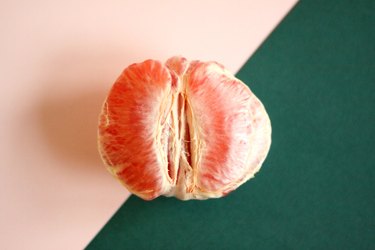
Gray hair, skin changes, weight fluctuations — these are all things you likely expect as you get older. But you may not be prepared for the effects Father Time has on other body parts like your vulva and vagina.
Like any other area of your body, both the appearance and function of the vagina are affected by the aging process, says ob-gyn Sheryl A. Ross, MD, author of She-ology: The Definitive Guide to Women's Intimate Health. Period and She-ology The She-quel: Let's Continue the Conversation.
Video of the Day
Video of the Day
Here, Dr. Ross shares how your vaginal region changes with age and what you can do to take good care of it into your golden years.
1. Your Vulva and Vagina May Appear More Saggy or Stretchy
With age, you may notice you look a little more deflated down there.
Many age-related factors can "influence the integrity and elasticity of the vulva and vagina," Dr. Ross says. Indeed, certain life events and normal aging can create sagging of the vulva and stretching of the vaginal opening.
Giving birth is a big one. "The vagina and all its elastic glory can only stretch so much during childbirth," she says. "With each vaginal delivery, there is a little more stretching, which has an accumulative effect that ultimately changes the outward appearance of the vagina."
After your reproductive years, you must contend with hormonal shifts that occur during perimenopause and menopause. And these can make your vulva and vagina appear thinner and saggier too, Dr. Ross says.
What you can do: If you’re unhappy with the way your private parts appear later in life, there are things you can do to tighten and reduce sagging skin in the vaginal area.
For example, “laser treatments and surgery are options if the sagging skin of the vulva and vagina interfere with daily activities such as exercise or sexual activity,” Dr. Ross says.
There are also less invasive routes to revitalize your vaginal region. “Simple daily lifestyle habits including hydrating, cleaning and moisturizing the vulva and vagina are preventative ways to care for this delicate part of the body,” she says.
But before you beautify your nether bits or rush into vaginal rejuvenation, first consider what’s driving your decision. “Porn and social media have created vaginal insecurity, which has helped move vaginal rejuvenation to the forefront,” Dr. Ross says.
In other words, unrealistic depictions of vaginas and vulvas can negatively affect how you feel about your own. If this is the case, exploring and processing your feelings might be a better avenue to take before you make any serious decisions about a surgical procedure.
2. You May Experience Vaginal Dryness
A healthy vagina is well-lubricated. But with age, you might develop vaginal dryness due to a drop in estrogen. This hormone maintains moisture in your vaginal lining, so when it's low, your vaginal walls become thinner and drier, according to the Cleveland Clinic.
In your lifetime, "there are three main hormonal assaults on the body that cause a drop in estrogen leading to vaginal dryness: breastfeeding, perimenopause and menopause," Dr. Ross says.
During these periods when the vaginal tissues lack lubrication, you might experience certain symptoms including the following, per the Cleveland Clinic:
- Discomfort and pain in your vagina, especially during sex
- Burning and itching
- Bleeding after sex due to your vaginal wall tissues breaking open
- Soreness in your vulva
- Recurrent urinary tract infections (UTIs) or yeast infections
- Needing to pee more often
- Not wanting to have sex
- Irritation when putting on your underwear or during normal activities like walking or sitting
What you can do: Luckily, you don’t just have to live with the discomfort of vaginal dryness. “These hormonal conditions can be reversible,” or, at the very least, manageable, Dr. Ross says.
For instance, “once you stop breastfeeding, the vagina will return to its normal healthy and hydrated state,” she says.
And during perimenopause and menopause, the use of estrogen — either as a pill or cream — can decrease the dryness caused by naturally low or erratic estrogen levels, Dr. Ross says.
Known as hormone therapy, this treatment restores the vagina to a healthier state by thickening the skin, increasing moisture and restoring its balance of acids and bacteria, according to the Cleveland Clinic.
Additionally, over-the-counter vaginal lubricants and moisturizers can lend lubrication to the vaginal lining and create comfort during sex, per the Cleveland Clinic.
Tip
While hormone therapy is a safe, effective option for many, it may slightly raise the risk of developing breast cancer, heart disease, stroke, blood clots and/or dementia for some people, according to the North American Menopause Society (NAMS). Be sure to discuss your specific risks with your doctor before you begin this type of treatment.
3. You May Be More Prone to Vaginal Infections
"The vagina is normally acidic, which is the perfect pH balance for the many protective organisms that all live happily together there," Dr. Ross says. "But anything that disrupts this delicate balance could lead to a vaginal infection."
And with age comes many possible disruptors. "Hormonal changes associated with pregnancy, postpartum, perimenopause and menopause disturb the normal microbiome of the vagina and can increase your risk of vaginal yeast and bacterial infections," Dr. Ross says.
On top of this, there are many other common irritants that may upset the vagina's pH balance and initiate an infection, including the following, per Dr. Ross:
- Fragrant soaps, bubble bath liquids, bath salts, talcum powder
- Detergents, fabric softeners and dryer sheets
- Sanitary wipes and pads
- Warming gels and scented lubricants
- Nylon underwear or bathing suits
- Rubber and latex products, such as diaphragms and condoms
- Saliva or semen
- Spermicides such as foams, creams and jellies
- Feminine hygiene sprays, tampons or deodorant pads
- Creams or ointments applied to the vulva
- Shaving and waxing the hair around the vagina
- Medications including some birth control pills, Accutane, allergy and cold medications and certain antidepressants
What you can do: If you experience any of the following symptoms, see your doctor who can properly examine, diagnose and treat you.
The most common signs of a vaginal infection to look out for are, per the Mayo Clinic:
- Change in color, odor or amount of discharge from your vagina
- Vaginal itching or irritation
- Pain during sex
- Painful urination
- Light vaginal bleeding or spotting
And while you can’t control hormonal changes that make vaginal infections more common in older age, you can avoid irritants that exacerbate the pesky problem.
4. Your Vulva May Change Color
Does the shade of your labia look a little different lately? Believe it or not, "aging can also cause changes to the skin color of the vulva and vagina," Dr. Ross says.
Once again, this happens in conjunction with hormonal shifts associated with estrogen, most often during pregnancy and menopause, which can increase pigment in the skin of the vulva and vagina, she explains.
To boot, skin trauma from sex, shaving, ingrown hairs, folliculitis and recurrent infections can also alter the pigmentation of your private parts, she adds.
5. You May Notice Less Pubic Hair
Your short and curlies may seem a little sparser in your senior years.
"Just like other hair on our body, pubic hair will start to thin out during different hormonal stages in our lives," Dr. Ross says.
For example, during menopause, your pubic hair may start to grow slower or less thick, she says.
In addition, certain medical conditions and use of some medications — which tend to become more common in older age — can also make pubic hair thin out, Dr. Ross adds.
While this new appearance may take an adjustment, you might even find having fewer hairs down there can be convenient. Think of it like this: There's less need for grooming (buh bye, bikini wax).
6. You May Develop Varicose Veins
It's common to see bigger, bluish veins crop up in your legs as you age, but varicosities in your vulvar region? Yep, varicose veins (i.e., twisted, enlarged veins) occur mainly in the legs and feet, but they can also surface near your vulva, Dr. Ross says.
You might notice these prominent veins pop up during pregnancy. It happens thanks to a boost in blood flow to the pelvic area, which makes them bulge, according to the Mayo Clinic
Other risk factors for vulva varicosities include obesity and standing for prolonged periods, as both place excessive pressure on the veins in your lower body, Dr. Ross says.
What you can do: “Vulvar varicosities can be supported by wearing compression underwear or nylons, avoiding prolonged standing and reducing excess salt intake in your diet,” Dr. Ross says.
“If varicose veins in the vulva become disruptive, there are also surgical procedures and helpful injectable medications to help manage and treat them,” she adds.
7. Your Vagina May Grow Shorter and Narrower
"Expect the unexpected as your vulva and vagina transition from perimenopause to menopause," Dr. Ross says.
Case in point: One of the strangest surprises is the possible shrinking of your vagina.
"With menopause and the loss of estrogen stimulation in the vagina, not only can the tissue become drier but also smaller," Dr. Ross says. Yep, without essential estrogen, the vaginal tissue can become less stretchy, and the vaginal canal can grow shorter and narrower, she says.
While this reduction in vaginal size may decrease your desire to have sex (especially if it becomes more painful), a lack of sexual activity, including penetration with a penis, dildo, sex toys or fingers, can just aggravate the problem, she says.
What you can do: It’s possible to restore your vagina to its former size through gentle stretching with vaginal dilators, i.e., tube-shaped devices designed specifically for this reason.
“Dilator sets come in a variety of shapes, sizes, colors and materials, while all sharing a common goal — helping restore vaginal capacity, stretching the vaginal opening and making intimacy, sexual intercourse or self-stimulation more pleasurable and comfortable,” Dr. Ross says.
Vaginal dilators accomplish this by increasing elasticity while strengthening and revitalizing vaginal muscles and tissue to keep them from becoming too short or narrow, she explains. One highly recommended option is the Full Vaginal Dilator set from Intimate Rose ($179.99, IntimateRose.com).
A Final Word
"The effect of aging on our body, including our vulva and vagina, is inevitable," Dr. Ross says. While not all changes are totally pleasant, your personal attitude and confidence are the most important factors in how you perceive your aging private parts.
Put simply: Your vulva and vagina are only as young and beautiful as you think they are, Dr. Ross says. So try to give your labia some love in your later years.
- Cleveland Clinic: “Vaginal Dryness”
- Cleveland Clinic: “Vaginal Atrophy”
- Harvard Health Publishing: “Preserve your muscle mass”
- Mayo Clinic: “Vaginitis"
- Mayo Clinic: “What causes vulvar varicosities during pregnancy? How can I relieve the discomfort?”
- North American Menopause Society: “Deciding About Hormone Therapy Use”
Is this an emergency? If you are experiencing serious medical symptoms, please see the National Library of Medicine’s list of signs you need emergency medical attention or call 911.


